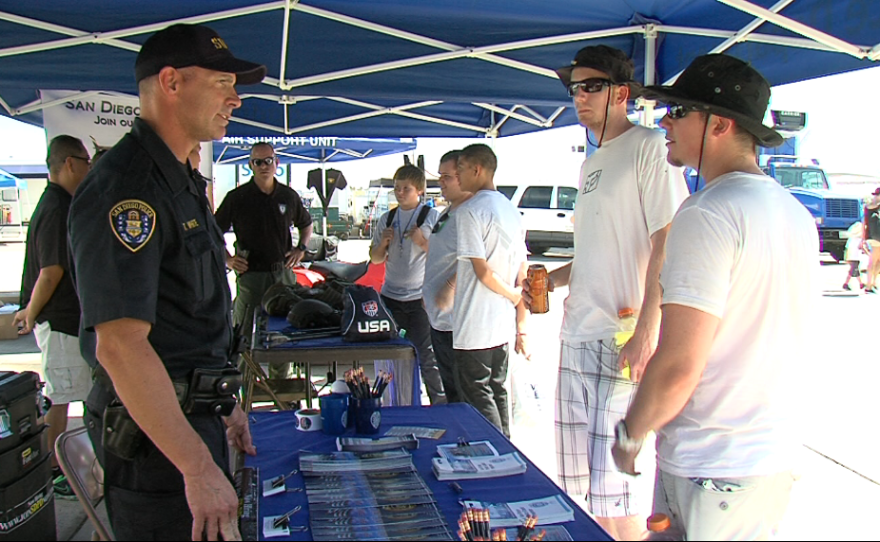San Diego Police Pay
A city-funded salary survey shows pay for San Diego police officers ranks near or at the bottom among 18 other departments in California. Here are the midpoint base pay salaries for San Diego officers and their rank among the other departments surveyed:
Recruit: $46,228, rank 18th
Officer I – II: $62,598, rank 19th
Officer III: $72,873, rank 5th
Detective: $72,873, rank 5th
Sergeant: $84,240, rank 17th
Lieutenant: $107,204, rank 16th
Captain: $127,328, rank 15th
Note: The midpoint calculation is the average of the minimum and maximum base pay rates.
As the number of officers on the San Diego police force continues to dwindle, the city and police union are working to keep more cops on staff.
They haven’t reached a deal yet, but both sides say one is imminent and it will boost the take-home pay of officers. Why? Because low pay appears to be a persistent factor in why the department is losing officers.
At an event this fall, San Diego police Officer Troy White worked to recruit new officers.
He didn’t have high pay to sweeten the offer, but when a potential recruit asked if there was a waiting list to join the force, White had a quick reply: “No, we’re hiring 700 officers over the next five years."
At the same event, San Diego County sheriff’s Detective Daniel Wilson tried to woo potential recruits a little bit differently. “You can see the competitive pay,” Wilson said.
The two recruiters’ approaches represent the struggle the San Diego Police Department has endured for years. Too many vacancies it can’t fill because better pay elsewhere lures officers away.
As of Dec. 15, the department has 1,859 officers on staff. That's down from 1,876 early last month.
Brian Marvel, president of the San Diego Police Officers Association, has said the staffing shortage has changed how officers police the city.
"A lot of the stuff that we did in 2000, the late 1990s, we’re not doing now," Marvel said.
He recalled an instance during his early days as an officer. The department received calls complaining about a North Park home.
"There was issues with rats and cats and some other stuff,” he said. “We made contact. The person wound up being a hoarder."
Garbage filled the home, Marvel said. Some piles reached the ceiling. With a well-staffed department at the time, he said, he had the support to spend a few hours each shift organizing mental health care workers to work with the home’s owner, vector control to deal with the animals and volunteers to clean up the house.
"So we’re helping this person who’s got this issue, but we’re also helping the neighbors because they're not having to deal with the rats and the cats all around the neighborhood," Marvel said.
But with today’s staffing levels, Marvel says the department can no longer take this community-policing approach.
"Now, we’re sort of working on a skeleton crew where obviously our highest priorities are answering 911 calls and high-priority calls for assistance," he said.
The city acknowledges the problem and recently completed a city-funded salary survey on police officer pay. The report showed San Diego cops make far less money than other agencies in the state — including the county Sheriff’s Department — and that led city officials to open the police union’s contract early for negotiations.
Marvel and Police Chief Shelley Zimmerman had hoped for a deal by this month, but the talks will stretch into the new year. The city countered the union’s proposal during a meeting this month, and they won’t talk again until sometime in January.
And it’s unclear what an agreement would even look like. For now, there’s a five-year freeze in the city on increasing pay that would add to any employee’s pension — whether the worker is in the Police Department or the Planning Department.
Still, Mayor Kevin Faulconer told KPBS recently that he’s committed to finding a way to give cops more money in their pockets.
“We’re going to pay our officers more. I can’t put it anymore simply," Faulconer said.
It may mean the city picks up a greater share of officers’ uniform allowance or health insurance premiums or some other benefit.
But once a deal is reached with the police officers, the city may have other unions asking for a pay boost. Alan Arrollado, president of the San Diego firefighters union, said the wage issue isn’t limited to the Police Department.
“The whole city is understaffed and struggling with staffing issues," Arrollado said.
An audit released this year shows the San Diego Fire-Rescue Department is overwhelmingly relying on overtime to keep shifts covered, something that has happened for years.
Arrollado said the city is preparing to do a salary survey for all of its employees, similar to the one done for the Police Department. He said he already knows what the results will show.
"San Diego firefighters are at the bottom of the pay list, or near the bottom of the pay list,” he said. “And if you actually put risk involved there, meaning the type of work that San Diego firefighters do, the risk that we take in comparison to these other cities, you will see we are even farther down the scale."
Arrollado said he’s keeping an eye on negotiations with the police officers to see what kind of position the city takes. But his union can’t begin renegotiation talks until January 2016. He hopes for sooner, but he’s not optimistic.







